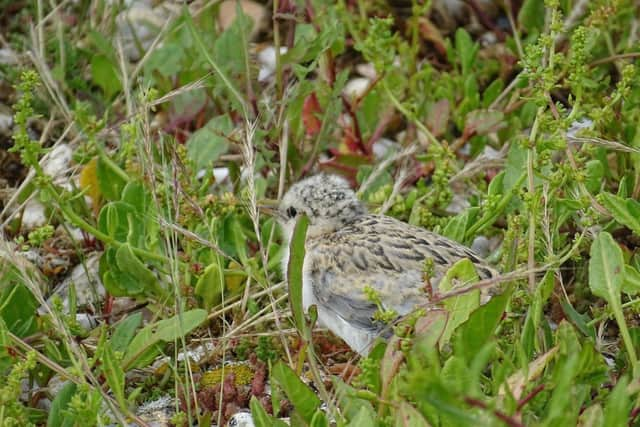Record-breaking breeding season for Solent seabirds is a ‘fantastic’ result for RSPB coastal reserves
and live on Freeview channel 276
This year, 25 little tern chicks fledged, along with 253 sandwich terns, at RSPB reserves across the Solent, including Pagham Harbour, Langstone Harbour, and the West Hayling Local Nature Reserve.
This success offers further hope for the future of the Solent’s seabird colonies.


Advertisement
Hide AdAdvertisement
Hide AdLittle terns are one of the UK’s smallest breeding seabirds and have faced drastic population declines in the last few decades due to habitat loss, climate change and human disturbance. The thriving colony at RSPB Pagham Harbour Nature Reserve is one of the few UK sites where little tern breeding numbers have risen relatively consistently in the last ten years.
Wez Smith, site manager at Eastern Solent Reserves, said: ‘The success of this year’s breeding season is a fantastic result for our Solent reserves, set against a sea of challenges. ‘Once again, this demonstrates that these birds can thrive when they are given space to nest in suitable and protected habitats, even relatively close to heavily populated areas.
‘They have provided an amazing summer spectacle for both the local community and tourists, and given many a sense of peace and solace after a difficult year.’
Since taking on the Pagham Harbour Nature Reserve from West Sussex County Council in 2012, the RSPB has worked to improve the fortunes of seabirds in this coastal landscape through habitat management and community engagement.
Advertisement
Hide AdAdvertisement
Hide AdThe RSPB looks after several sites along the Solent where threatened ground-nesting birds raise young right on the edge of our coastal communities.
These include ringed plovers, oystercatchers, and several species of gulls and terns.
These birds are coming under increasing pressure from human disturbance, as many people don’t realise that such threatened species nest on the ground in this area.
Thanks to funding from a new EU partnership project called LIFE on the Edge, the RSPB are also working to help secure the future of threatened species on the Solent.
Advertisement
Hide AdAdvertisement
Hide AdThis will be done through creating and restoring habitat which will help protect breeding sites against climate change.
An upcoming project to restore the shingle habitats at West Hayling and Langstone Harbour will safeguard this nesting spectacle next to the coastal path for another generation.
